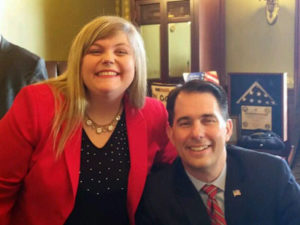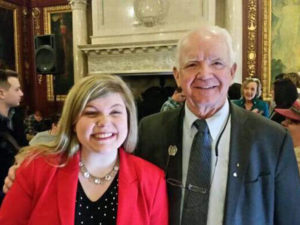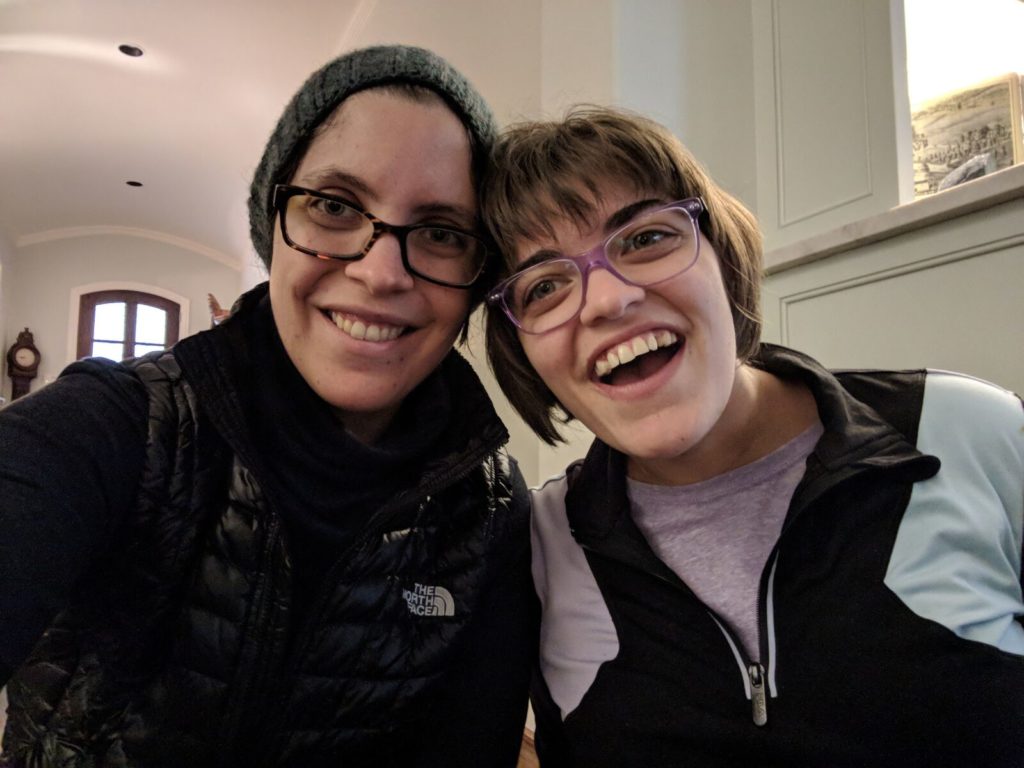When Will Employment First Be a Reality? This Autism Acceptance Month, It’s Now in Wisconsin
The Arc Wisconsin celebrates a major victory in Wisconsin, the passage of a ground-breaking Employment First bill that will hold state agencies accountable to update and improve policies, set benchmarks and report on their progress to increase the number of people with disabilities in Wisconsin working in competitive integrated employment. One of The Arc Wisconsin’s leading advocates for this legislation was Ashley Mathy of Rhinelander who has autism. In recognition of Wisconsin’s progress and Autism Acceptance Month, Ashley shares with us in her own words why this new law is so important to her and the thousands of people with disabilities in Wisconsin.
By Ashley Mathy

Ashley Mathy from Wisconsin, who has autism, stands with Governor Scott Walker after he signed the state’s Employment First law on March 28.
Hello, I am Ashley Mathy a self-advocate who has PDD, NOS (Autism spectrum). I have a simple answer to a question. The question is “When?” Before I answer, please consider- as you know, the month of April is Autism Acceptance month. Education and awareness of Autism are so important to me personally because of my daily struggles with anxiety, social challenges and much more. So many people look at autism behaviors as strange versus accepting the person and all the wonderful gifts and abilities we can offer this world. On the positive side my challenges with Autism have given me the personal experience needed to share my stories, challenges and successes with so many people. Throughout this journey, it has made me realize that Autism doesn’t define me…it is just a word. The truth is I am a fighter. I am a warrior. I am a leader. I am a friend. I am a daughter. Doctors and teachers believed that I would not be able to work in the community and college would not be a likely option. I have proven doctors and teachers wrong by showing them I can overcome any obstacle that is put in front of me. I believe that you never know how strong you are unless you are put to the test…Autism was my test. Christopher Robin says: “You’re are braver than you believe, stronger than you seem and smarter than you think” and who can argue with a Winnie the Pooh expert!! Today, I assist in the Dean’s office at Nicolet College, speak around the State of Wisconsin for disability advocacy and market Soap Sisters which stands for “Sister of Autism Princess”, (a company that my sister and I started) and take classes at Nicolet College.

Ashley shared her employment story with many state legislators, including Representative James Edming pictured in this photo in the Wisconsin Capitol, to help get Wisconsin’s law passed.
I am so proud and excited to be part of promoting the Employment First Law. Integrated employment for people with disabilities is by far my biggest advocacy goal. I personally know so many people with special needs that want to work AND contribute to their community, PLUS they want to make a positive impact in this world. We have so many talents they we can bring to the table such as being a reliable employee, positive can-do attitude and very hard worker. People with disabilities have that “fire” to get the job done to the best of their abilities while making every attempt to overcome any obstacles in a job.
Personally, I struggled with finding the right job for my skills and abilities. I got caught between the priorities of all the agencies helping me find a job. After much determination, I found several jobs that are a perfect fit for me. With the passage of the Employment First bill, the agencies will be required to work together and develop a joint plan with the same goal in mind; securing employment for people with special needs. This teamwork will be a powerful tool for Wisconsin to move forward and for individuals to take their rightful place in the community and workforce.
I believe the key to success in life is everyone working together towards the same common goal. The passage of this Employment First Bill and the determination of people with special needs along with the support of employers and agencies… will make a difference in lives, and ensure a WIN- TOGETHER! The answer to the question of, “When?”. My simple answer is, NOW- RIGHT NOW.




 Meet Joe Damiano! Joe is 23 years old and is a very active advocate in his home state of New York. Joe is the outreach director for The Arc’s National Council of Self-Advocates, a board member for a local non-profit, and the former chair of a self-advocacy group called the Collaborative of New York.
Meet Joe Damiano! Joe is 23 years old and is a very active advocate in his home state of New York. Joe is the outreach director for The Arc’s National Council of Self-Advocates, a board member for a local non-profit, and the former chair of a self-advocacy group called the Collaborative of New York.





